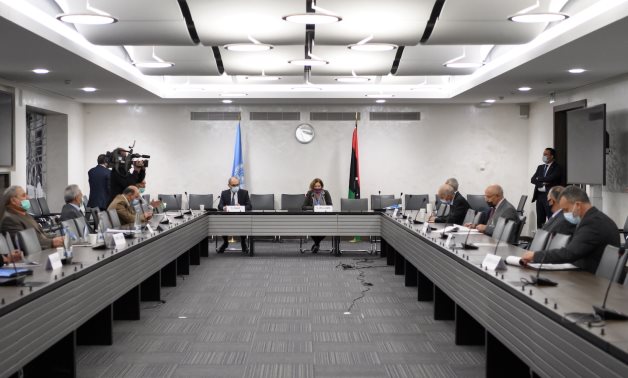
A general view of the talks between the rival factions in the Libya conflict at the United Nations offices in Geneva, Switzerland October 20, 2020 . Fabrice Coffrini/Pool via REUTERS
CAIRO - 16 February 2020: Acting Head of the United Nations Support Mission in Libya, Stephanie Williams, announced, on Sunday, the conclusion of the Libyan talks in Tunisia, without forming a unified government.
"The talks will resume next week via video conference to agree on mechanisms and criteria for selecting the figures who will assume power in the future," Williams said in a press conference. She added that the participants in the Libyan Dialogue Conference in Tunis agreed to hold an online meeting a week later to discuss the implementation mechanisms of the agreements they reached.
At the end of the conference, Williams noticed a complete agreement between the parties to organize the elections in December 2021. She said that the participants agreed on the need for change in Libya, and the importance of implementing a plan to reform public institutions.
The Libyan political dialogue, held under international auspices, concluded Sunday in Tunisia, after a week of direct discussions that ended in an agreement to organize elections in December 2021, according to the United Nations.
Williams confirmed that she is extremely satisfied with the outcomes of these negotiations, especially concerning the agreements on the road map and the powers of the executive authorities.
The Gammarth Forum near the Tunisian capital included 75 representatives from all parties, chosen by the United Nations according to their geographical, political or ideological affiliation, but excluding the main parties.
The United Nations announced on November 13 that the delegates in Tunisia have agreed to hold national elections on December 24, 2021, without specifying whether it will be presidential, parliamentary, or general elections.
Representatives had to define the powers of a unified government charged with organizing elections and meeting the needs of Libyans dissatisfied with the corruption and collapse of services. They should also choose the main officials of this executive authority, which is a Presidential Council consisting of three members and a head of government.
These discussions followed the ceasefire that was officially announced in October, after the cessation of hostilities in June between the Government of National Accord and the Libyan National Army forces, as progress was made on the economic, military, and political levels, after several rounds of talks.
Comments
Leave a Comment